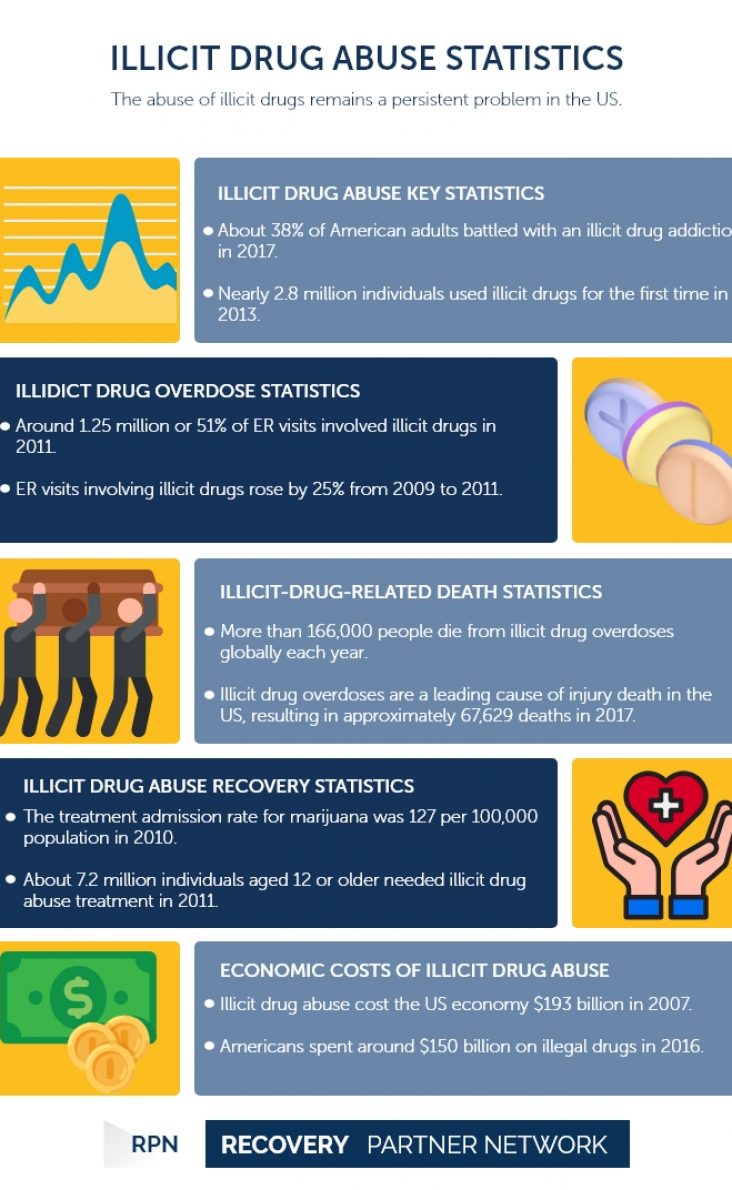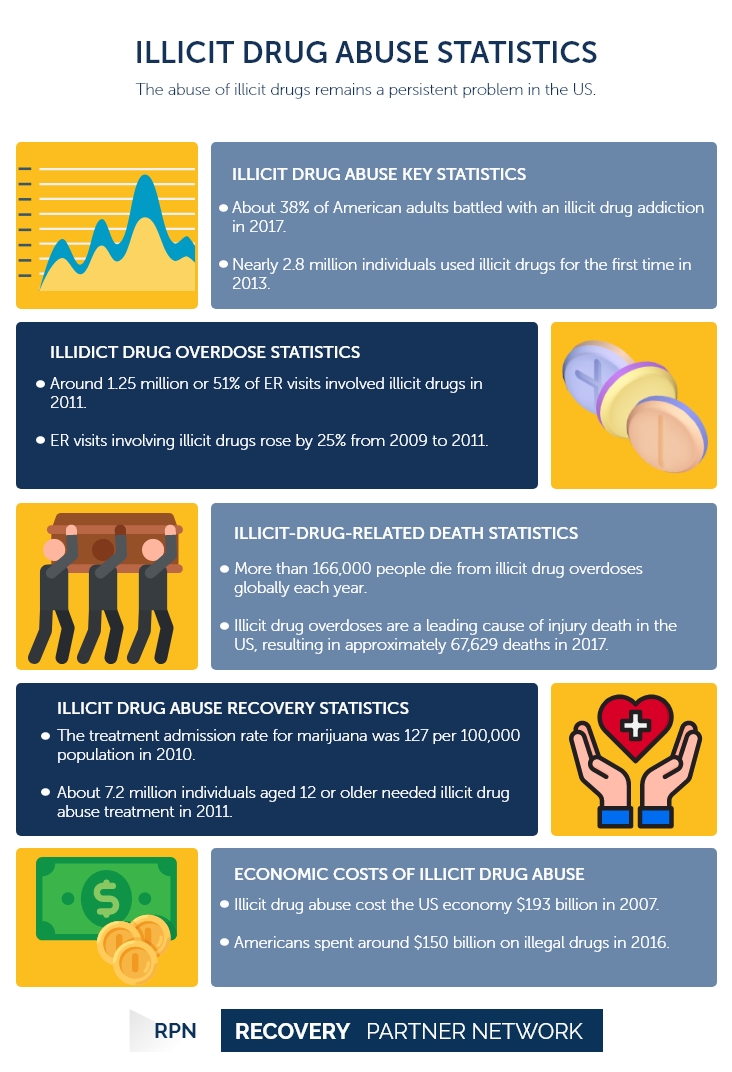The abuse of illicit drugs remains a persistent problem in the US.
Illicit Drug Abuse Statistics
Substance use disorder
- Alcohol abuse statistics
- Amphetamine abuse statistics
- Cannabis abuse statistics
- Cocaine abuse statistics
- Heroin abuse statistics
- Illicit drug abuse statistics
- Inhalant abuse statistics
- Methamphetamine abuse statistics
- Opioid abuse statistics
- Prescription Drug abuse statistics
- Tobacco abuse statistics
Illicit drug abuse statistics | Table of Contents
Illicit Drug Abuse
Illicit drugs refer to substances that are highly-addictive and illegal for consumption, production, or distribution, such as crack, meth, and heroin. Illicit drugs possess the ability to stimulate or inhibit the CNS or generate hallucinogenic effects, causing changes to the way an individual’s brain functions. This may eventually result in physical dependence or addiction that can be difficult to overcome. Certain illicit drugs are able to cause addiction even after a single-use.
Illicit Drug Abuse Key Statistics
- According to the National Survey on Drug Use and Health (NSDUH), around 31.9 million individuals aged 12 and above used some sort of an illicit drug in 2018.
- About 38 percent of American adults battled with an illicit drug addiction in 2017.
- The most popular illicit drug of choice among teenagers is marijuana, followed by prescription painkillers and inhalants.
- About 124 million Americans reportedly used marijuana at some point in their lives, while around 14.9 million Americans admitted to using methamphetamines at some point in their lives.
- According to the Substance Abuse and Mental Health Services Administration (SAMHSA), about 2.8 million individuals used illicit drugs for the first time in 2013.
- Men are more likely to abuse illicit drugs than women, although women are just as likely to develop an addiction to them when abused.
- Illicit drug use amongst 8th, 10th, and 12th graders has been relatively stable over the last few years, with a rate of 33.9 percent in 2019.
- A 2018 study states that the US has one of the highest rates of illicit drug abuse from across the world.
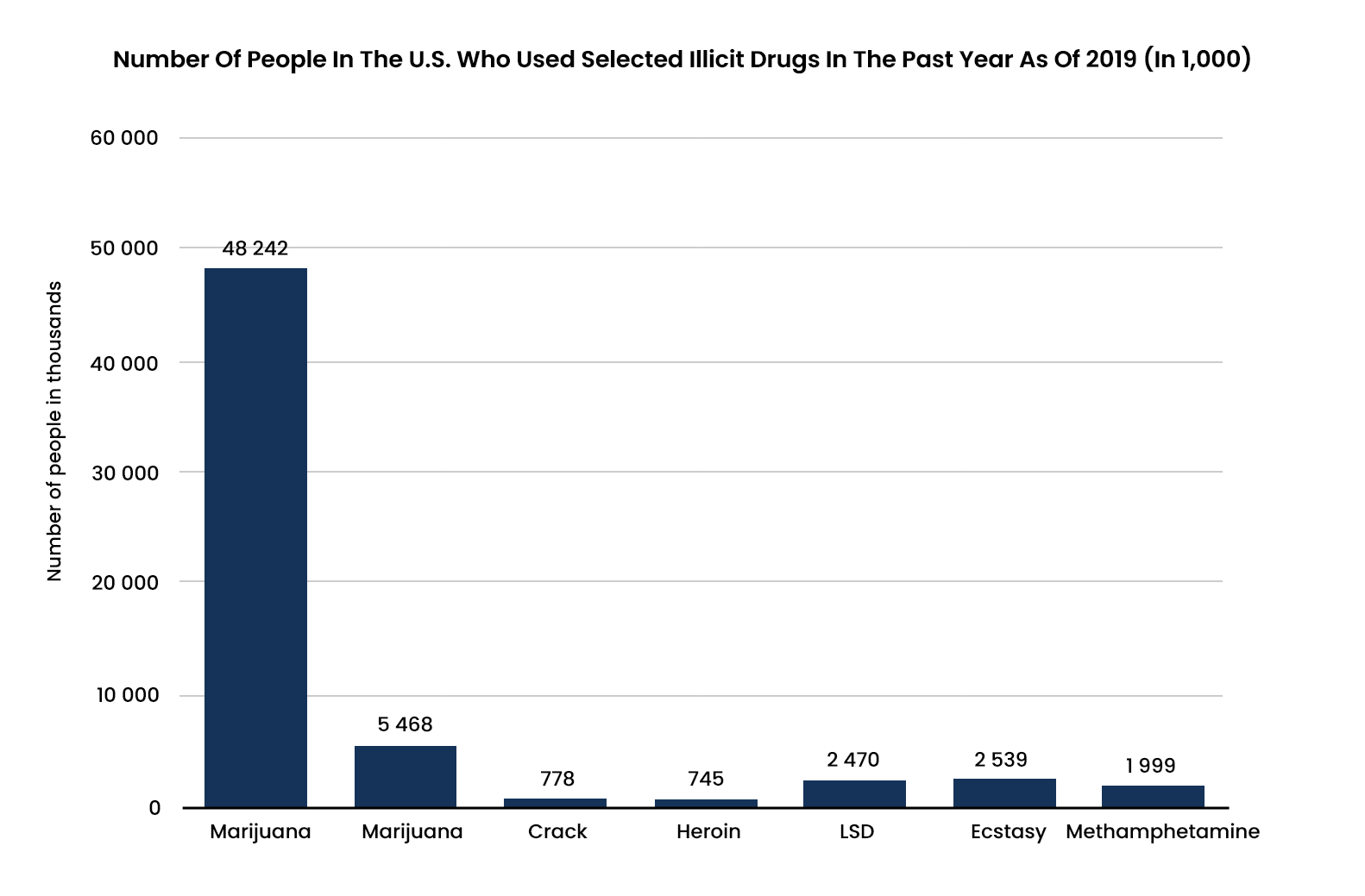
Illicit Drug-Related ER Statistics
Individuals who use illicit drugs are at a higher risk of experiencing an overdose. Illicit drug overdoses can occur when individuals consume large quantities of the drug accidentally or intentionally. Individuals who experience an overdose must seek immediate medical attention to avoid fatal consequences.
- In 2009, about 21.2 percent of emergency room visits involved illicit drugs.
- The rates of emergency room visits for illicit drugs such as cocaine, marijuana, and heroin were relatively higher in males than in women.
- In 2011, around 1.25 million or 51 percent of emergency room visits involved illicit drugs.
- The highest rates of emergency room visits in 2011 were associated with illicit drugs such as cocaine and marijuana.
- According to the Centers for Disease Control and Prevention (CDC), emergency room visits involving illicit drugs were relatively stable from 2004 to 2009 but increased by 25 percent from 2009 to 2011.
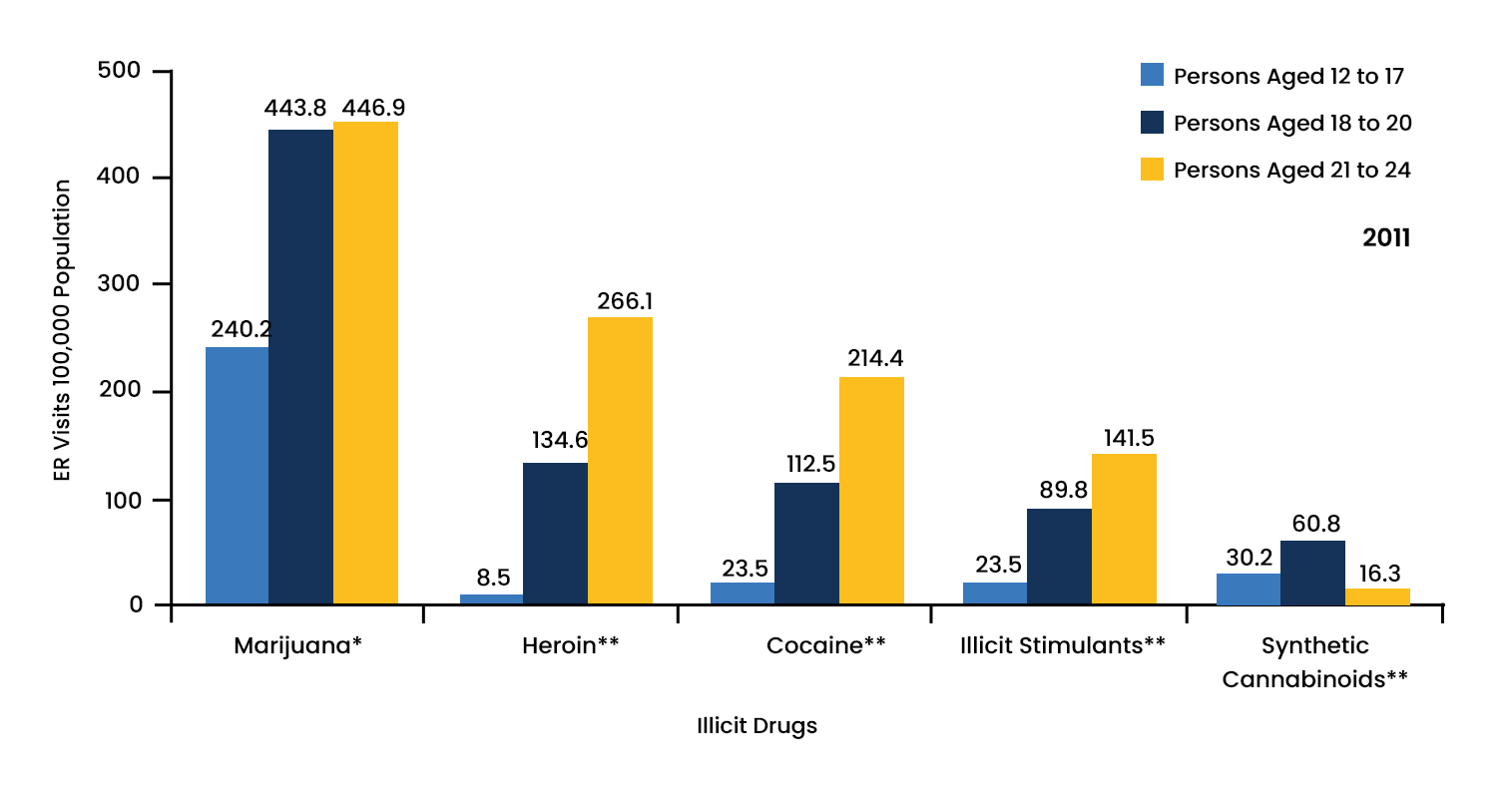
Illicit Drug-Related Death Statistics
Deaths from illicit drug abuse can be divided into two categories such as direct deaths from illicit drug overdoses and premature deaths from diseases or injuries due to illicit drug use, also known as indirect deaths. The overall death due to illicit drug use in the US is around 104,937 in 2017.
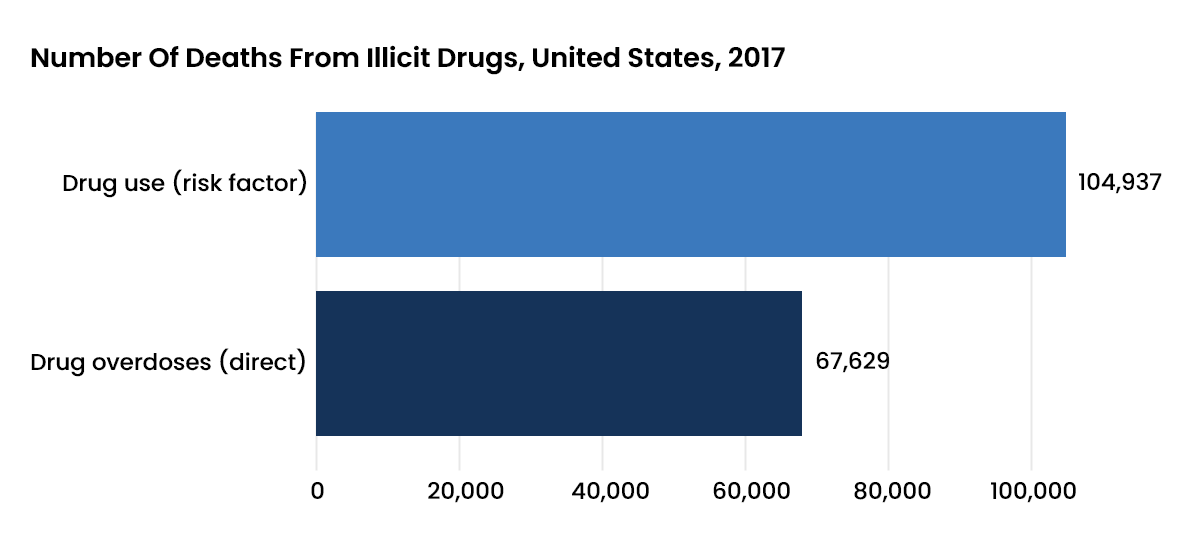
Indirect Death Statistics: Premature Deaths from Illicit Drug Use
- Around 585,000 individuals die prematurely each year globally due to suicides, liver diseases, hepatitis, cancers, and HIV associated with illicit drug abuse.
- Estimates reveal that around 44 percent of drivers involved in fatal vehicle crashes in the US tested positive for drugs, including illicit drugs.
- The US was one of the many countries to have a notably high disease and illness burden due to illicit drug abuse in 2010.
- Premature deaths due to illicit drug use increased from 14,139 to 53,475 in 15 to 49-year-olds, 6,917 to 39,000 in 50 to 69-year-olds, and 3,460 to 12,460 in 70-year-olds and above from 1999 to 2017.
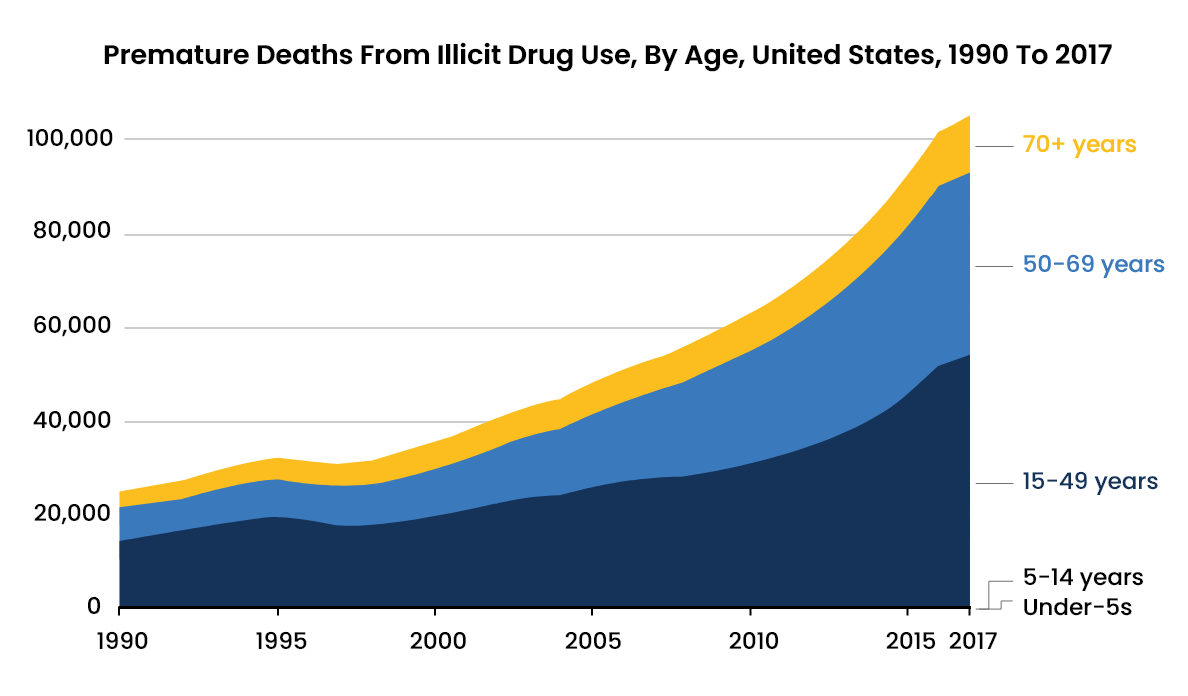
Direct Death Statistics: Illicit Drug Overdose Deaths
- Almost half of the individuals who die of illicit drug overdose globally are younger than 50 years.
- Drug overdose is the leading cause of injury death in the United States, resulting in approximately 52,000 deaths in 2015.
- More than 166,000 people die from illicit drug overdoses globally each year.
- Drug overdoses are a leading cause of injury death in the US, resulting in approximately 67,629 deaths in 2017.
- The illicit drug overdose death rate in nonmetropolitan areas (17 percent) was significantly higher than in metropolitan areas (16.2 percent)in the US, in 2015.
- Overdose deaths related to cocaine and psychostimulants escalated from 26.5 percent to 34.8 percent from June 2019 to May 2020 in the US.
- Illicit drug-related overdose deaths increased to 44,224 in 15 to 49-year-olds, 20,122 in 50 to 69-year-olds, and 3,284 in 70-year-olds and above in 2017, in the US.
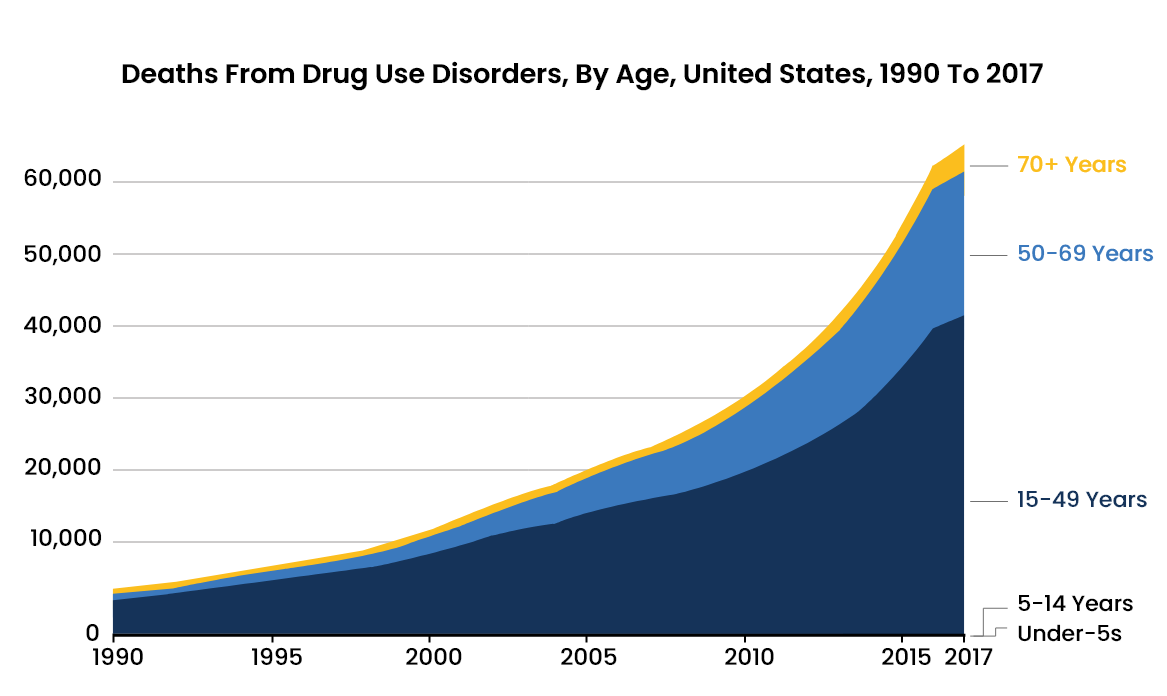
Illicit Drug Abuse Recovery Statistics
Individuals with an addiction to illicit drugs seldom seek treatment due to the fear of withdrawal and social stigma. From the 20.7 million individuals aged 12 and older who required treatment for a substance use disorder during 2017, only 4 million individuals received treatment.
- According to the National Institute on Drug Abuse (NIDA), only about 2.6 million individuals (11.2 percent of those who needed treatment) received treatment for illicit drug addiction at a specialty facility in 2009.
- The treatment admission rate for illicit drug abuse was 127 per 100,000 population for marijuana and 97 per 100,000 population for heroin in 2010.
- In an analysis comparing the data from NSDUH and N-SSATS, the average counts of individuals in treatment for alcohol and illicit drugs accounted for 1.2 million from 2007 to 2009.
- In 2011, the number of persons aged 12 or older needing treatment for illicit drug abuse was at 7.2 million (2.8 percent of the total population).
- From those who required treatment for illicit drug abuse in 2011, 1.4 million (0.5 percent of the total population and 18.8 percent of persons who needed treatment) received treatment at a specialty facility in the past year.
Economic Costs of Illicit Drug Abuse
Illicit drug abuse cripples the economy in terms of costs related to incarceration, premature deaths, reduced productivity, and hospitalization. Drug abuse and addiction cost American society more than $740 billion annually.
- The NIDA reveals that illicit drug abuse cost the US economy about $98 billion in 1992. This included $14.6 billion in premature deaths, $9.9 billion in healthcare expenditure, and $14.2 billion in reduced productivity.
- Illicit drug abuse cost the US economy $193 billion in 2007.
- The US healthcare cost of illicit drug abuse was at $11 billion in 2007.
- The US criminal justice cost of illicit drug abuse was at $61 billion during 2007.
- Americans spent around $150 billion on illegal drugs during 2016.
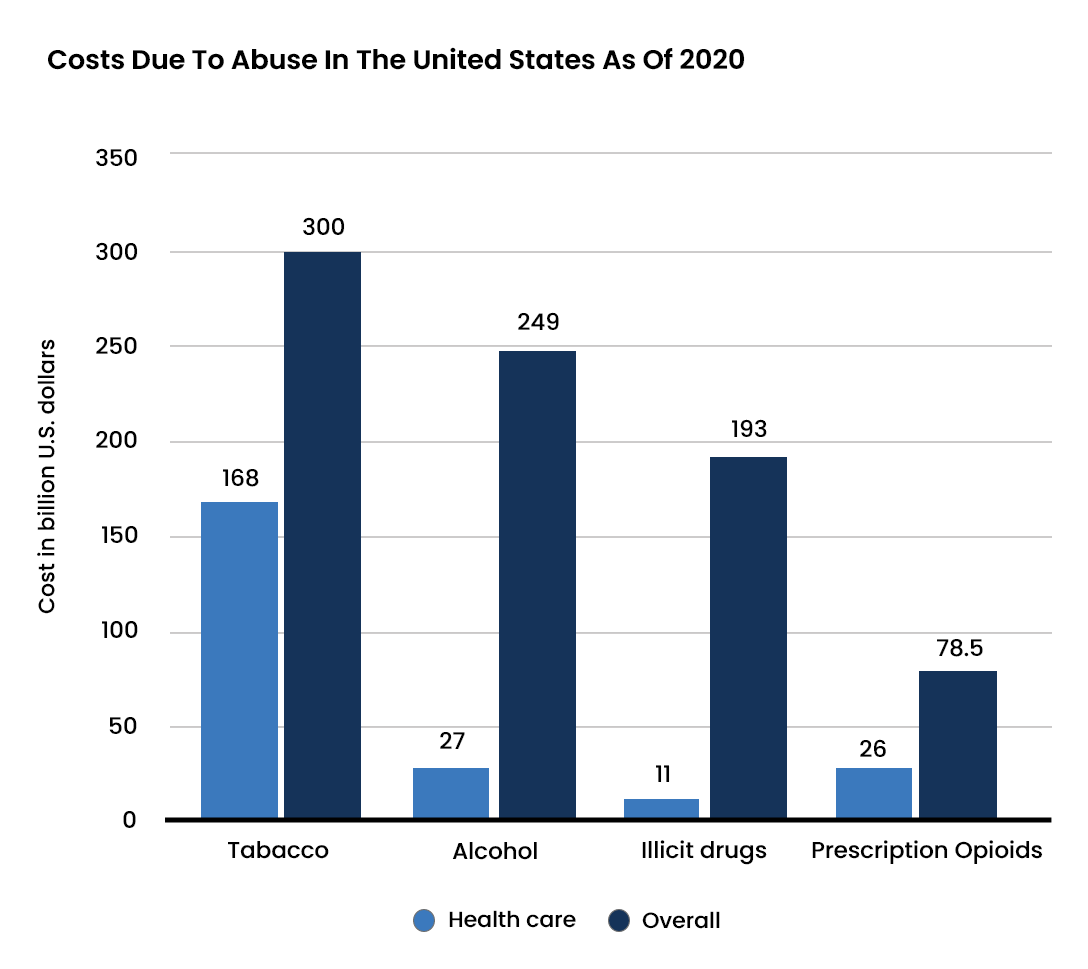
Recovery Partner Network
We aim to educate and empower. If you feel our library of resources does not cover your specific need, reach out to us, and we would be happy to help.
STATISTICS
© Copyright 2026

